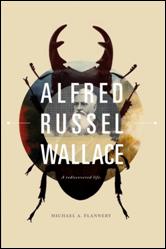 Faith & Science
Faith & Science
 Intelligent Design
Intelligent Design
Did I Too Conveniently Omit Mention of Alfred Russel’s Wallace Interest in Spiritualism?
 A reader, Dan Neiman, protests that in my recent article, “On Alfred Russel Wallace, NPR Gets It Right, Sort Of . . .,” I didn’t note Wallace’s spiritualistic views. “Wallace,” writes Mr. Neiman, “investigated mediumistic and paranormal phenomena in a scientific manner and found evidence for them.” This is very true, and ENV readers are invited to look for themselves at Wallace’s Miracles and Modern Spiritualism (the 1875 edition is available online, but I suggest the 3rd edition of 1895). So why did I omit it? Am I guilty of the same offense as NPR — selectively reporting on Wallace’s beliefs? I think not and here is why.
A reader, Dan Neiman, protests that in my recent article, “On Alfred Russel Wallace, NPR Gets It Right, Sort Of . . .,” I didn’t note Wallace’s spiritualistic views. “Wallace,” writes Mr. Neiman, “investigated mediumistic and paranormal phenomena in a scientific manner and found evidence for them.” This is very true, and ENV readers are invited to look for themselves at Wallace’s Miracles and Modern Spiritualism (the 1875 edition is available online, but I suggest the 3rd edition of 1895). So why did I omit it? Am I guilty of the same offense as NPR — selectively reporting on Wallace’s beliefs? I think not and here is why.
If you examine Wallace’s Man’s Place in the Universe and his World of Life, you will see that Wallace’s argument for guidance and purpose in the universe is made quite apart from his spiritualistic beliefs. For example, he makes a case for the uniqueness of humanity and complex life forms on earth generally based upon statistics and probability analysis. That so many stringent requirements could be duplicated elsewhere at another place and time, he thought, seems remote and unlikely in the extreme. In nature he cites certain features of biological life that give evidence of design and purpose such as the complexity of the cell and the bird’s wing. For Wallace, natural selection was incapable of accounting for these features of the natural world. This establishes him within the ID heritage.
ID theorists make no claims about the nature of the designer or its purpose, and it is similarly not necessary to say anything about Wallace’s spiritualism to understand what I call his theory of “intelligent evolution.” My not mentioning it in my original post is, therefore, not the same kind of omission as NPR’s. Wallace’s teleological views, as expressed in the two books mentioned above, actually deserve inclusion in his corpus of scientific works, the one on cosmology and the other a grand evolutionary synthesis. The NPR story, in attempting to give a laudatory account of Wallace’s scientific contributions, should have legitimately included and explained them.
Even so, none of this is to say we should simply ignore Wallace’s spiritualism. In fact, his first chapter in Miracles and Modern Spiritualism presents a devastating reply to David Hume’s skepticism. Like famed Harvard psychologist William James, Nobel laureate in physics Lord Rayleigh, physicist William Crookes, Nobel laureate in medicine Charles Richet, and many other first-rate scientists, Wallace wanted to scientifically investigate spirit phenomena. As historian Martin Fichman has noted in An Elusive Victorian, “He [Wallace] was part of a broad sociocultural as well as intellectual community for whom investigations into the spiritual realm were epistemologically significant, politically influential, and emotionally rewarding” (p. 140). For a thorough account of this movement within Victorian science, see Deborah Blum’s Ghost Hunters.
In fact, there is something to Peter Lamont’s argument that spiritualism was ultimately rejected not because of a “crisis in faith” but due to a “crisis in evidence.” Unable to thoroughly discount all spiritualist phenomena, the leaders of an emergent scientific orthodoxy premised upon methodological naturalism dismissed it as “subjective experience,” focused on the many cases of fraud, and refused to investigate further (see Lamont’s “Spiritualism and a Mid-Victorian Crisis of Evidence“). Of course fraud was not in itself a reason to reject the phenomena. As G.K. Chesterton once wryly noted, “A false ghost disproves the reality of ghosts exactly as much as a forged banknote disproves the existence of the Bank of England — if anything, it proves its existence.”
Nevertheless, it is important to emphasize that spiritualism is certainly distinct from ID. Significantly, Wallace’s teleological views long preceded his adoption of spiritualism. Again, Fichman is correct when he writes (p. 79) that Wallace
was clearly sympathetic to certain teleological concepts from the outset of his career. But Wallace’s first tentative steps toward an evolutionary teleology were implicit rather than explicit. Certain of Wallace’s pre-1858 writings, however, indicate that he had indeed adopted teleological elements as part of his emerging evolutionary hypothesis but in a characteristically idiosyncratic fashion.
When Wallace was a young man of twenty he asked, “Can any reflecting mind have a doubt that, by improving to the utmost the nobler faculties of our nature in this world, we shall be better fitted to enter upon and enjoy whatever new state of being the future may have in store for us?” It was a question Wallace spent the rest of his life answering.
So I see Wallace’s views on spiritualism as important in understanding the man as a whole, but clearly set apart from his ideas about cosmological or biological teleology. True, these have profound philosophical implications, but the evidence for design itself remains sufficient and distinct enough to stand on its own. As such, when we speak of Wallace’s scientific prowess, his teleological arguments are clearly a part of that scientific worldview and should be included. Wallace’s spiritualistic views extend beyond that.
I thank Mr. Neiman for this opportunity to clarify such an important aspect of Wallace’s life and career.
Professor Flannery is the author of Alfred Russel Wallace: A Rediscovered Life (Discovery Institute Press) and other books.
